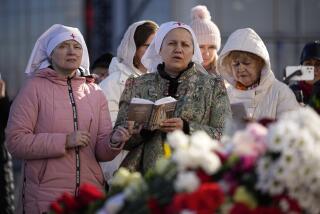Moscow Police Break Up Rally and Arrest 20
- Share via
MOSCOW — Riot police scuffled with protesters in Pushkin Square and about 20 people were arrested Sunday after demonstrators ripped up a poster-sized photograph of President Mikhail S. Gorbachev and burned the Soviet flag to protest the Communist Party’s monopoly on power.
A group of reformist legislators, meanwhile, held a daylong meeting at which some warned of a growing conservatism in the Kremlin and others repeated a controversial call for a two-hour nationwide strike today to oppose longstanding constitutional guarantees of the party’s dominance over Soviet society.
The latest calls in Moscow to amend the constitution’s Article 6, which enshrines the Communist Party as “the leading light and guiding force” in the nation, reflect growing frustration here that the Soviet Union may no longer be keeping pace with Eastern European reforms.
Both East Germany and Czechoslovakia in recent weeks have revised the role of the Communist Party as the primary national political force. But Gorbachev, speaking Saturday at a Central Committee plenum, accused deputies calling for a similar change in the Soviet Union of trying to “demoralize Communists.”
Several hundred protesters who rallied in subzero temperatures Sunday on a square beneath a statue of Russian poet Alexander Pushkin denounced Gorbachev as a dictator and accused him of failing to keep pace with the dramatic reforms of Eastern Europe.
They shouted slogans against the country’s party leadership and the KGB and carried anti-Communist signs. “Communism Equals Fascism,” said one. Another equated Gorbachev with former Soviet leader Josef Stalin. The woman who tore up the photograph of Gorbachev drew cheers and applause. Some demonstrators waved the red, white and blue flag of pre-Communist Russia.
The unauthorized demonstration, held to coincide with International Human Rights Day, was sponsored by the Democratic Union, among the most radical of the independent political movements.
After less than an hour, scores of white-helmeted riot police swooped in to break up the protest, scuffling with some demonstrators unwilling to leave.
The official news agency Tass, in an unusually speedy report of the demonstration, said some of the signs and banners waved during the protests denigrated “the dignity of Communists and included direct threats.”
“About 20 people were detained for extreme hooliganism,” Tass reported.
In a sanctioned demonstration to commemorate Human Rights Day--this one peaceful--several thousand people marched down Prospect Mir, a busy Moscow thoroughfare, and gathered in front of exhibition grounds containing displays marking the country’s economic achievements.
They carried banners demanding the release of political prisoners and the amendment of Article 6. Traffic was halted for 90 minutes to allow the marchers to proceed.
Earlier Sunday, legislator Boris N. Yeltsin, former Moscow city party boss and maverick member of the Central Committee, told a meeting of the progressive deputies who call themselves the Inter-Regional Group that he became convinced at Saturday’s plenum that conservative forces hold the balance of power in the Kremlin.
In a hard-hitting speech to an audience of about 800 gathered in a central Moscow hall, Yeltsin cited as evidence the unwillingness of the Central Committee to include proposals involving private ownership, self-management and the amendment of Article 6 on the agenda for the Congress of People’s Deputies. This year’s second session of the congress begins Tuesday.
Yeltsin quoted a Central Committee member he did not identify as calling on leading party officials to act during the congress to “gather legislators and work on them” so they would follow the Communist Party line.
He also said right-wingers vowed to take control of future elections so they would not be as free-wheeling as those held in March, in which a number of Communist Party officials were defeated.
Yeltsin added that he himself was denounced during the plenum for his outspoken criticism of some aspects of Soviet society during a trip this summer to the United States.
After Yeltsin spoke, academician and fellow deputy Andrei D. Sakharov drew a round of applause as he rose and responded: “The situation has changed since yesterday. Those who straddled the fence yesterday must understand today that we have to resist the reactionaries.”
The deputies adopted a carefully worded resolution that said each lawmaker in the group had the political right to act independently and called for the population to support them through writing letters, sending telegrams or in other unspecified ways.
The resolution did not mention today’s planned strike. Sakharov, however, rebuffed critics who have said a political strike would simply further damage the already fragile Soviet economy.
“A two-hour strike is not destructive,” Sakharov said, adding, “Out of all the forms of expressing the people’s will, this is the most expressive and clear.”
His words were echoed by another progressive legislator, Leonid Batkin, who said the decision to strike was “an act of desperation, when nothing is left to be done. We have to act fast and resolutely to prevent the right-wingers from taking over. We have no time to fear the consequences.”
“The government, and I am sorry for this fact, has already lost most of its credit of trust of the people,” added legislator and economist Gavril Popov. “The people will be watching very carefully all the measures which will be adopted by the government in the future.”
More to Read
Sign up for Essential California
The most important California stories and recommendations in your inbox every morning.
You may occasionally receive promotional content from the Los Angeles Times.












